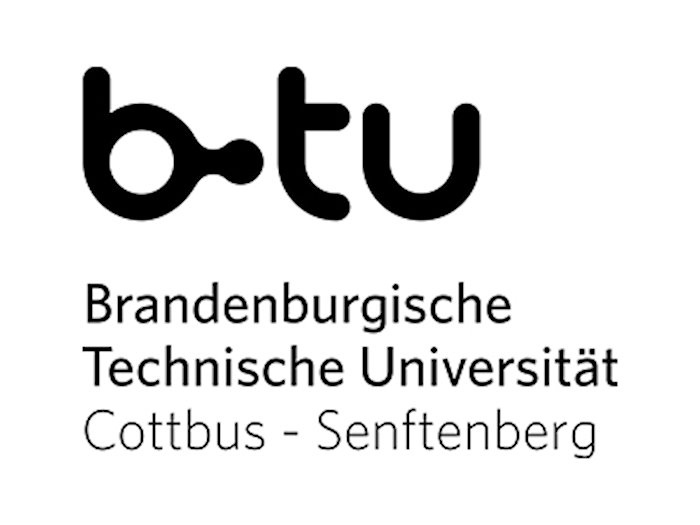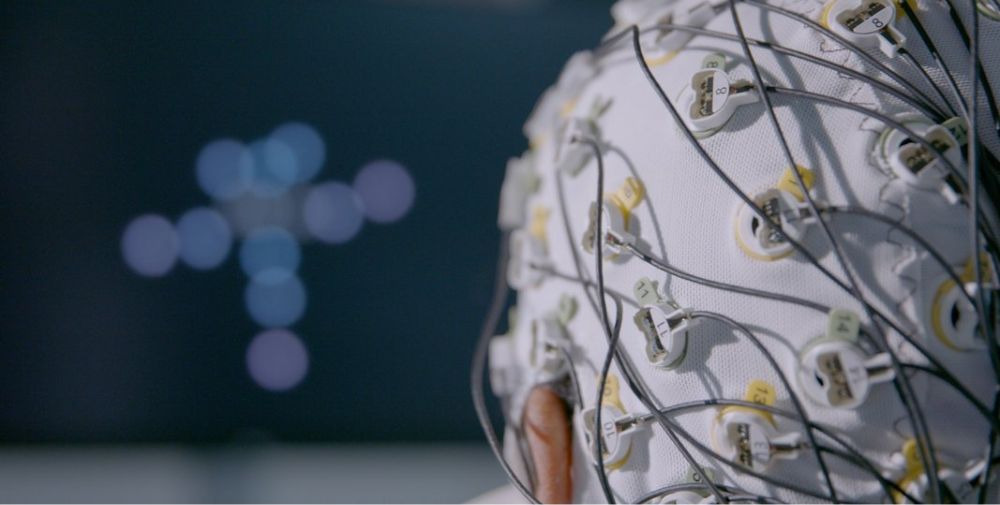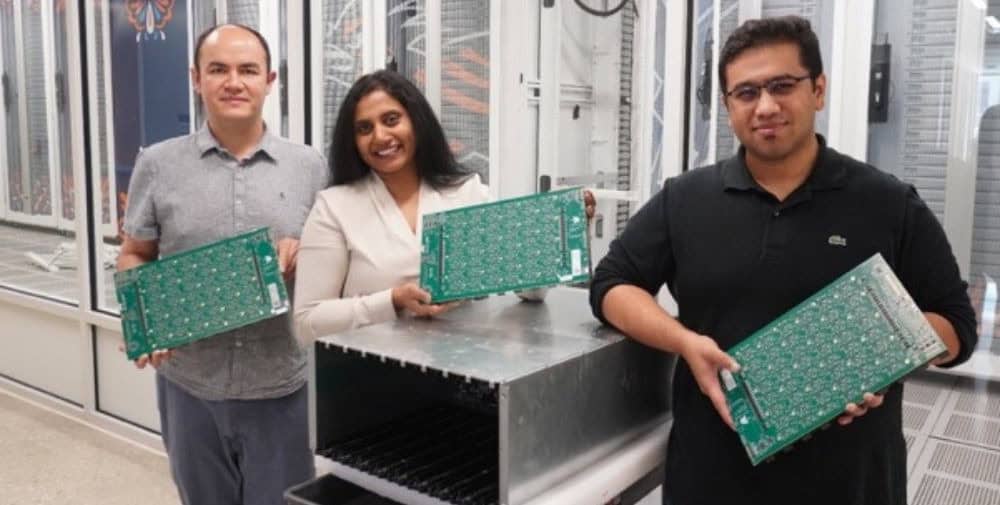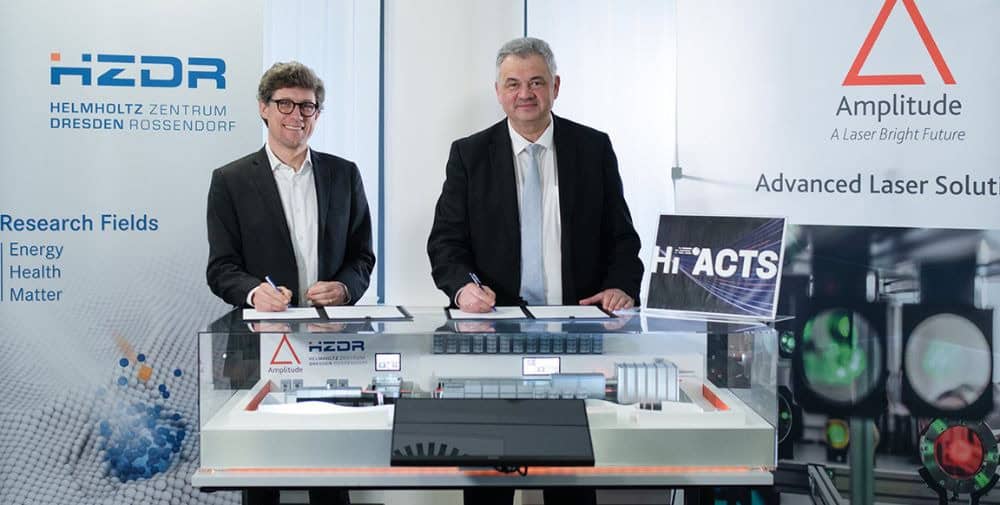
On December 15, 2023, the management and project management of the Cyberagentur’s new research contract with the contractor Zander Laboratories GmbH (Zander Labs) met at the Brandenburg University of Technology Cottbus-Senftenberg (BTU) to sign a contract worth around 30 million euros. The Cottbus start-up won the competition with the most innovative idea for researching neurotechnology in the context of human-machine interaction over four other providers. The contract is the largest single funding of a research project in the European Union awarded by the Cyber Agency.
On October 7, 2022, the Agency for Innovation in Cybersecurity GmbH (Cyber Agency) published its tender procedure “Secure Neural Human-Machine Interaction”. The aim of the tender was to design the benefits of human-machine interactions in a beneficial and safe way for the citizens of the Federal Republic of Germany at an early stage in terms of cybersecurity.
Startup can convince with groundbreaking idea
Zander Labs proposes the innovative project “Neuroadaptivity for Autonomous Systems” (NAFAS), which aims to revolutionize the interaction between humans and machines. Although technology has made tremendous progress, machines remain limited in their ability to understand, learn and respond to human emotions, mental states and cognitive decision making. This limitation leads to cumbersome communication between humans and technology and limits the potential of human-computer interaction. The NAFAS project aims to change this paradigm. The project is working with a so-called passive Brain Computer Interface (pBCI). This means that, in contrast to conventional approaches in neurotechnologies, the user does not have to actively imagine certain things, but – as we are used to in everyday life – simply performs the desired action.
The researchers then try to use the brain signals to find out which mental states the person has used to achieve their goal. The ultimate aim is to identify categories that can be transferred to artificial systems and enable machines to interpret human mental reactions in a given context. The goal is to explore a new generation of machines that can adapt to the user’s cognitive and affective states in real time to personalize the user experience and improve the effectiveness of autonomous systems without the need for manual input.
Prof. Dr. Thorsten Zander, Managing Director of Zander Labs and Lichtenberg Professor of Neuroadaptive Human-Technology Interaction at BTU, and his team are looking forward to the start of the NAFAS project commissioned by the cyber agency. “Our declared aim is to redesign the interaction between humans and technology: We are striving for systems that can intuitively adapt to the individual user based on their brain activity and for AI applications that learn directly from the human brain.”
“The project impressed us with its conceptual strength and innovative approach,” says Dr. Andreas Schönau, deputy project manager and research officer in the Human-Machine Interaction unit of the Secure Society department at the cyber agency. “The implicit approach is unique and has the potential to set new scientific standards in the neurosciences.”
The researchers at Zander Labs will develop neurotechnological prototypes over the next four years. These should be able to read information from a brain so that a person can exchange information with an external system via their thoughts and thus guide it to complete a task or learn new skills.
If this is successful, humans and machines will be able to carry out actions, pursue goals and exchange information together via pBCI. At the end of the project, four demonstrators will be created that contextualize the principle presented and transfer it to concrete use cases in internal and external security.
Human-machine interaction without invasive interventions
“The revolution will be that we enable machines to capture and interpret brain data in real time, giving them an insight into the user’s current, individual perception and interpretation. This will enable us to transfer the user’s knowledge, values and goals to the machine, allowing intuitive interaction,” says Prof. Dr. Zander, summarizing his concept. “This approach in the field of brain-computer interfaces (BCI) clearly shows the differences in approach between the USA and Europe. While the US favors invasive methods and focuses mainly on medical applications, we focus on non-invasive technologies and aim to serve users without limitations. This will revolutionize human-machine interaction.” Zander Labs places the highest value on security and privacy when processing brain data and transferring it to the machine. This is possible because the systems are compatible with humans and the artificial intelligence is therefore aligned with that of humans. Despite the significantly higher funding in the USA, this pioneering research approach is therefore being rethought and further developed in Germany and Europe. Europe is at the forefront of research in this field.
As the leading force behind this project, Zander Laboratories GmbH is pooling both its own expertise and the specialized knowledge of the subcontracted institutions. These include the Fraunhofer Institutes for Photonic Microsystems (IPMS) and for Digital Media Technology (IDMT), the Dutch TNO, Brain Products GmbH in Munich, Eaglescience Software B.V. in Haarlem as well as academic institutions from the Brandenburg University of Technology Cottbus-Senftenberg, the University of Vienna and the Julius-Maximilians-Universität Würzburg.
Science Fiction ‘Made in Cottbus’: Great importance for science location
The Research Director of the Cyber Agency, Prof. Dr. Christian Hummert, read out the message of greeting from Brandenburg’s Minister for Science, Research and Culture, Dr. Manja Schüle: “No, this is not a new film project by Steven Spielberg or Ridley Scott – this is science fiction ‘Made in Cottbus’: Prof. Thorsten Zander from BTU wants to develop neurotechnological prototypes with his start-up Zander Laboratories GmbH and thus revolutionize the interaction between man and machine as well as artificial intelligence. A highly exciting project. And it is sensational that the cyber agency is providing 30 million euros for this disruptive and innovative approach. This is another great boost for science and research in Lusatia. And who knows: maybe we will see Thorsten Zander’s prototypes in a Hollywood blockbuster in the future.”
Prof. Dr. Hummert added: “Just like in these visionary science fiction films by the two movie stars, the work at Zander Laboratories GmbH is like a cinematic odyssey that blurs the boundaries between man and machine. We are faced with a challenge that is reminiscent of the complex plots of these directorial legends: risky, but groundbreaking. NAFAS could put us at the forefront of technology. This research can be a leap forward for Germany’s digital sovereignty and also a potential catalyst for cultural resonance that goes far beyond the boundaries of science.”
Prof. Dr.-Ing. Michael Hübner, Vice President for Research and Transfer at BTU Cottbus-Senftenberg, said: “We congratulate Professor Zander and his highly innovative start-up on being awarded the contract for this project. The technology that he and his team are researching can be used in many areas. These areas fit very well with the profile lines of BTU Cottbus-Senftenberg. In particular, the profile lines ‘Artificial Intelligence and Sensor Technology’ and ‘Health and Life Sciences’ offer the best points of contact. I am looking forward to the research results and the collaboration with his start-up.”
The Mayor of the City of Cottbus, Tobias Schick, welcomed Dr. Markus Niggemann, Deputy Mayor and Head of the Financial Management, Economic Development & Social Affairs Division: “The commissioning of Zander Labs will strengthen the scientific excellence of the city and influence the development of innovative technologies. This major scientific contract with a Cottbus-based company will drive forward the transfer of our urban society into a region of the future. The city administration will therefore continue to promote cooperation between the municipality, scientific institutions and industry in order to further develop Cottbus with the university and research institutions such as Zander Labs into a center of scientific progress in the Lusatia region.”
Scientific publications Brain-Computer Interfaces:
Kapitonova, M., Kellmeyer, P., Ball T.: A Framework for Preserving Privacy an Cybersecurity in Brain-Computer Interfaces Applications. NeuroMentum AI GmbH on behalf of the Agency for Innovation for Cybersecurity GmbH. (2022). https://www.cyberagentur.de/wp-content/uploads/2022/07/20220705-OFFEN-BCI-Framework-Abstract.pdf
Zander, T. O., & Kothe, C. (2011). Towards passive brain-computer interfaces: applying brain-computer interface technology to human-machine systems in general. Journal of neural engineering, 8(2), 025005.
Zander, T. O., Krol, L. R., Birbaumer, N. P., & Gramann, K. (2016). Neuroadaptive technology enables implicit cursor control based on medial prefrontal cortex activity. Proceedings of the National Academy of Sciences, 113(52), 14898-14903.
Background: Cyber Agency
The Agency for Innovation in Cybersecurity GmbH (Cyber Agency) was founded in 2020 as a fully-fledged in-house company of the Federal Government under the joint leadership of the Federal Ministry of Defense and the Federal Ministry of the Interior and Homeland by the Federal Government with the aim of taking a cross-departmental view of internal and external security in the field of cybersecurity with a focus on application strategy. Against this backdrop, the work of the cyber agency is largely aimed at the institutionalized implementation of highly innovative projects that are associated with a high risk in terms of achieving the objectives, but at the same time can have a very high potential for disruption if successful.
The Cyber Agency is part of the National Security Strategy of the Federal Republic of Germany.
The Cyber Agency is headed by Prof. Dr. Christian Hummert as Research Director and Managing Director and Daniel Mayer as Commercial Director.
Contact
Prof. Dr. rer. nat. Thorsten Zander
Neuroadaptive Human-Technology Interaction
T +49 (0) 355 5818-613
thorsten.zander(at)b-tu.de
– – – – –
Further links
👉 www.zanderlabs.com
👉 www.cyberagentur.de/bci
👉 www.cyberagentur.de/cyberagentur-startet-zweites-millionen-forschungsprojekt/
Photo: Gedachtegoed




